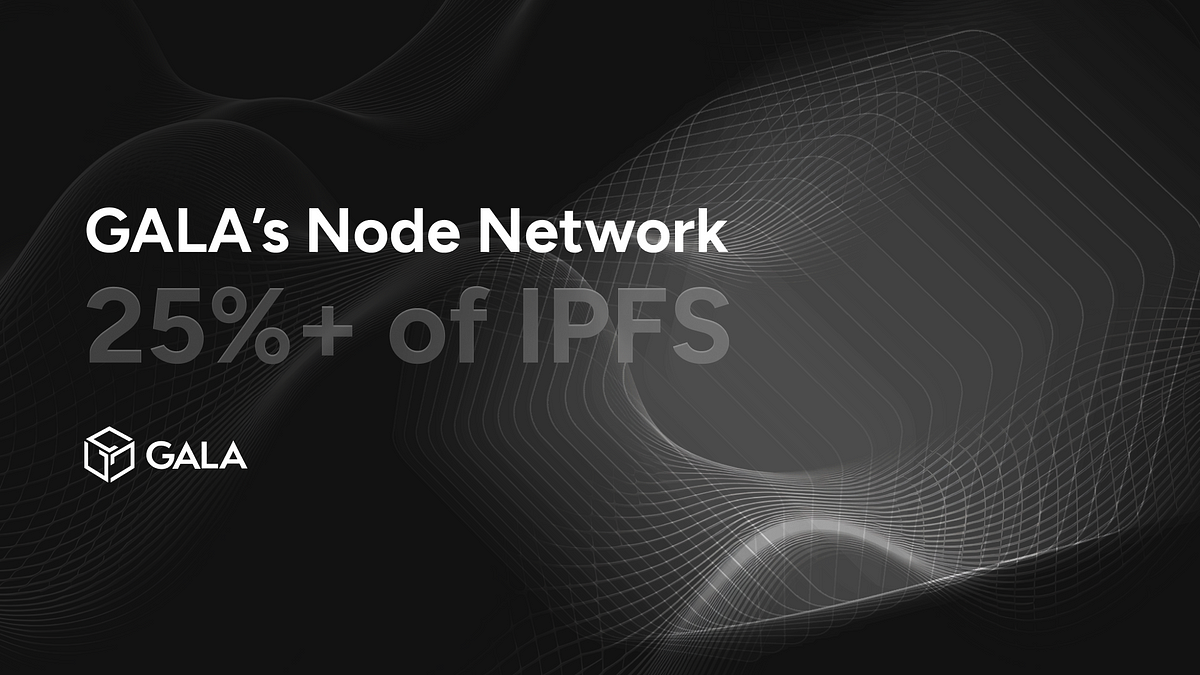A huge portion of the decentralized web is powered by Gala’s node network | Gala Games | February 2024
Gala Games Founder Nodes make up approximately 30% of IPFS servers, and Gala is at the forefront of Internet decentralization.
You may have recently heard rumors about how Gala Founder’s Nodes form a large part of the decentralized internet and IPFS. It is true that our Founders Nodes account for nearly 30% of the most active stable peers in the IPFS Distributed Hash Table (DHT), but this is only the beginning of the story. With nearly 24,000 DHT servers online, the Gala Founder’s Node ecosystem makes a huge contribution to decentralized storage and computing and is the single largest contributor to IPFS today!
In this blog we would like to shed some more light on how this came to fruition in the context of an accidental misconfiguration a year ago that revealed the real part of the decentralized internet powered by Gala nodes.
We think this is an incredibly interesting story about the resilience and security of decentralized networks, and is especially relevant today as we prepare to onboard greater numbers than ever before to GalaChain, a sustainable and capable L1 blockchain. I think it’s a story. But first, let’s talk a little about the role Gala Founder’s Nodes play in supporting the very existence of the decentralized Internet protocol known as IPFS and the InterPlanetary File System.
We want our non-technical followers to understand and appreciate the importance of this story, so we’ll try to keep it simple when explaining it. However, if you want a more in-depth approach with more charts and data, feel free to check out this article from Probelab.io.
InterPlanetary File System is a web3 Internet protocol launched in 2015 and designed to decentralize and democratize Internet content ownership.
Simply put, it is a solution for storing and sharing files that is the decentralized answer to cloud-style storage.
Instead of uploading files to a specific server, you break them into smaller chunks and spread them across multiple computers around the world. Each chunk gets a unique fingerprint called a CID, like a personalized code.
All you need is a CID to access the file. Special networks called DHTs (like giant distributed phone books) help users find computers with specific chunks. Finally, the chunks are downloaded from that computer and put back together.
DHT is maintained by nodes in IPFS’s various peer networks, such as expert operators, who can quickly query and retrieve encrypted data in IPFS. Gala Founder’s Nodes are thought to be one of the best information operators in the game, with ample storage and bandwidth to ensure you always have access to your most important files wherever you are online.
In January 2023, a slight misconfiguration of the Gala founder node in IPFS’s libp2p resource manager caused the Gala founder node to become unresponsive within the IPFS network for a short period of time. Although the downtime was only a few hours, the number of unresponsive nodes had such a significant impact on the overall number of network nodes that IPFS required further study of this issue.
Since it was discovered that the unresponsive nodes during that period were actually Gala Founder’s Nodes (due to misconfiguration), IPFS had a rare opportunity to take a snapshot showing a portion of the Gala Founder’s Nodes from the overall pool of DHT server nodes. .
This article on the IPFS blog describes an unresponsive node incident (pictured above) with a quickly implemented solution.
Perhaps the most interesting thing about this incident is that even with about 60% of the nodes unresponsive, DHT was able to deliver content as intended and keep IPFS running slightly slower than usual. This is a testament to the power of the decentralized internet, where software can be updated instantly across multiple distributed node networks without negatively impacting IPFS performance.
Due to the inherent cryptographic security of decentralized networks, it can be difficult to derive specific information about where support is coming from. However, under these circumstances, engineers at Interplanetary Shipyard were able to derive some interesting results from the data. They were even kind enough to share with us when we asked for a quote in early February 2024.
“The latest figures show that of the 20093 colleagues who appeared online last week, 5321 (who were online more than 80% of the time) were Gala colleagues. This accounts for over 26% of the network. I’m sure there are more Gala peers in the network and there are more peers in the IPFS network as well. “They are just the most stable peers.” — Yiannis Psaras, IPFS Shipyard
It is worth noting that there are more than 5321 nodes running every day. This number is just the most active nodes in the ecosystem and still makes up a huge portion of the overall peers in the network. There are also tens of thousands of other nodes running on the Founder’s Node Network, showing how much more flexibility we have to collaborate when needed.
We would especially like to thank Yiannis Psaras (cited above) and Dennis Trautwein from Probelab for their help in providing this data. Probelab is one of the largest contributors to IPFS Shipyard, a collection of open source projects created and maintained by IPFS community members.
Probelab is a benchmarking and optimization team “with a mission to measure the performance of Web3.0 network protocols, benchmark protocols against target performance milestones, and propose improvements to key design principles.” (From Probelab Introduction)
These people are the heroes of the decentralized era, whose work is always needed but rarely seen. Thank you so much for your great work on the fundamentals of web3!
***
We are really proud that Founders Nodes are a large part of our DHT server nodes. Nonetheless, we are even more proud of the fact that when those nodes go down, the decentralized internet continues to function and never misses a beat.
Well done, decentralized pioneers!

